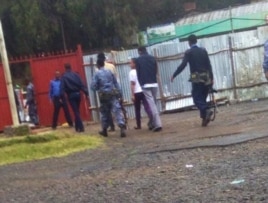There are tentative signs that the people of Ethiopia are beginning to organize themselves and stand up against the Ethiopian People’s Revolutionary Democratic Front (EPRDF) government, a brutal dictatorship, albeit one dressed in Western democratic garb.
After 23 years of suppression at the hands of the EPRDF, simmering discontent and anger appear to finally be spilling over onto the streets. Robbed of hope, the people have had enough, enough of the wide-ranging human rights abuses, the denial of constitutional rights, the arbitrary imprisonments and torture, the regime violence, the displacement of people from ancestral land, the partisan distribution of aid and the rising cost of living.
The government’s heavy-handed reaction to the Oromo protests is but the latest example of the regime’s ruthless response to criticism of its policies. Political opposition parties, when tolerated at all, have been totally marginalized, dissenting independent voices are quickly silenced and a general atmosphere of fear is all pervading. Despite freedom of expression being a constitutional right, virtually all media outlets are either government owned or controlled; “blogs and internet pages critical of the Ethiopian government are regularly blocked and independent radio stations, particularly those broadcasting in Amharic and Afan Oromo, are routinely jammed,”Human Rights Watch says.
The EPRDF has created “one of the most repressive media environments in the world”. Reinforcing this condition, “the government on 25 and 26 April arbitrarily arrested nine bloggers and journalists in Addis Ababa. They remain in detention without charge,” Human Rights Watch reports.
International human rights groups (whose activities have been severely restricted by the stifling Charities and Societies Proclamation of 2009) as well as foreign journalists are not welcome, and reporters who attempt to reach demonstrations are turned away or detained, making it difficult to confirm the exact numbers of those killed by government security personnel.
The UN Human Rights Council recently reviewed Ethiopia’s human rights record under the Universal Periodic Review.
Since the first review in 2009 the human rights situation has greatly deteriorated. The EPRDF rules the country through fear and intimidation, it has introduced ambiguous, universally condemned legislation to control and intimidate – the Charities and Societies Proclamation law and the Anti-Terrorism Proclamation especially.
Freedom of assembly – another constitutional right – is not allowed or, as can be seen with the Oromo protests, is dealt with in the harshest manner possible.
The Internet and telecommunications are controlled and monitored by the government and phone records and recordings are easily obtained by security personnel.
Arbitrary arrests and false Imprisonment of anyone criticizing the government is routine as is the use of torture on those incarcerated.
In the Ogaden region the regime is committing gross human rights abuses which constitute crimes against humanity, and in Gambella and the Lower Omo Valley large numbers of indigenous people have been forcibly moved into government camps (villagization programme), as land is sold for pennies to international companies.
In short, human rights are completely ignored by the government in Ethiopia.
As the people begin to come together and protest, international pressure should be applied on the regime to observe the rule of law and uphold the people’s fundamental human rights.
We are living in extraordinary times, times of opportunity and change, times of great hope. With elections due next year, now is the time for the various ethnic groups and factions inside and outside Ethiopia to unite, speak with one voice and demand their rights to freedom and justice.

 የዞን-9 ጋዜጠኞችና ብሎገሮች አራዳ ፍርድ ቤት ቀረቡ
የዞን-9 ጋዜጠኞችና ብሎገሮች አራዳ ፍርድ ቤት ቀረቡ አራዳ ፍርድ ቤት
አራዳ ፍርድ ቤት